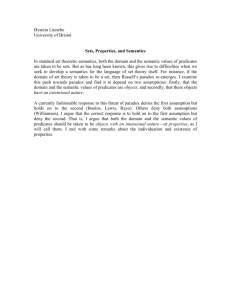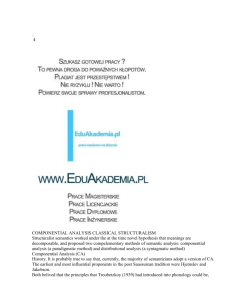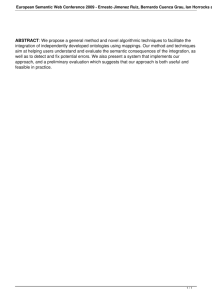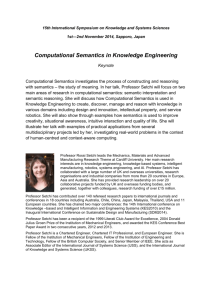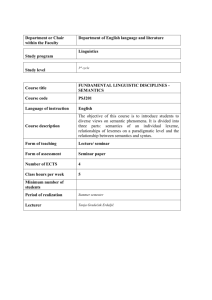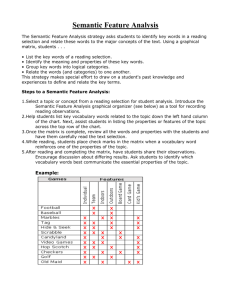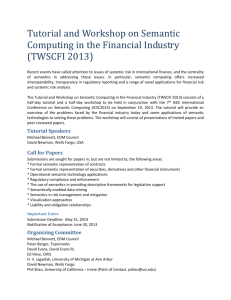SUPER-presentation
advertisement
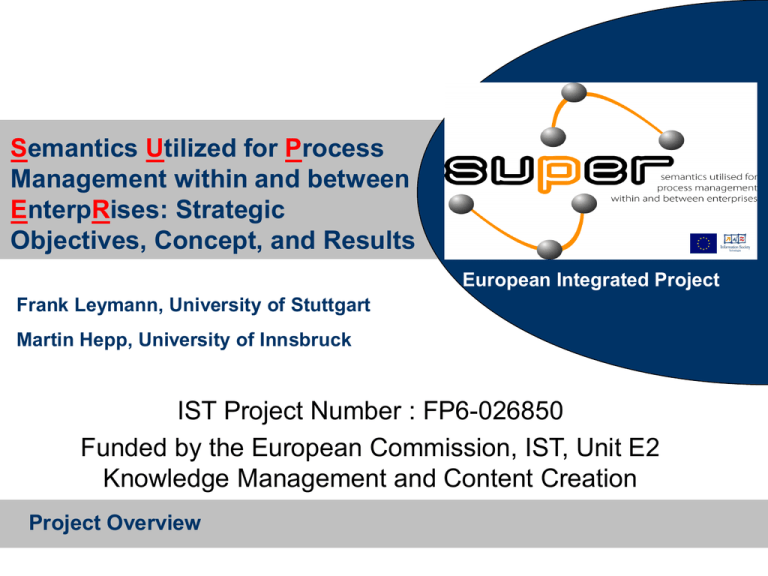
Semantics Utilized for Process Management within and between EnterpRises: Strategic Objectives, Concept, and Results European Integrated Project Frank Leymann, University of Stuttgart Martin Hepp, University of Innsbruck IST Project Number : FP6-026850 Funded by the European Commission, IST, Unit E2 Knowledge Management and Content Creation Project Overview The Logo European Integrated Project The Consortium ■ ■ ■ ■ ■ ■ ■ ■ ■ ■ ■ ■ ■ ■ ■ ■ ■ ■ ■ SAP AG, Germany (Coordinator) ETEL AUSTRIA AG, Austria IBIS PROF. THOME AG IBIS, Germany IBM RESEARCH GMBH, Switzerland IDS SCHEER AG, Germany INTELLIGENT SOFTWARE COMPONENTS S.A., Spain LEOPOLD-FRANZENS UNIVERSITAET INNSBRUCK, Austria MIP Consorzio per l'Innovazione nella Gestione delle Imprese e della PA, Italy NATIONAL UNIVERSITY OF IRELAND – GALWAY, Ireland NEXCOM BULGARIA EAD, Bulgaria NIWA-WEB SOLUTIONS NIEDERACHER and WAHLER OEG, Austria SIRMA GROUP CORP., Bulgaria THE OPEN UNIVERSITY, UK Telefónica Investigación y Desarrollo Sociedad Anónima Unipersonal, Spain AKADEMIA EKONOMICZNA W POZNANIU, Poland TECHNISCHE UNIVERSITEIT EINDHOVEN, Netherlands UNIVERSITÄT STUTTGART, Germany TELEKOMUNIKACJA POLSKA S.A., Poland CEFRIEL - Società consortile a Responsabilità Limitata, Italy The Need and the European Dimension Cost per Process Execution Companies are subject to competition in at least three dimensions Lack of Efficiency Lack of Evolutionary Granularity Lack of Agility Delay of Process Setup The Critical IT / Process Divide Business Experts’ Perspective: Processes Querying the Process Space Manual Labor Process Implementation IT Implementation Perspective What Are My Services? Here is my business process! I think this solves my business problem nicely… A1 A2 A3 Nice try, but it won’t run… You need to specify the services that perform each step! A4 What are my services? I don’t understand about these technical details! This is my view on the process… A1 pT1 A2 A3 pT2 o.k. no problem, I will help you… A4 pT3 What are my services? This is cumbersome! Why do I always need IT staff to solve my business problems? It takes too long to get these folks, they use different terminology than I do… I am happy to describe what the activities do in my terms. Can the system be smart enough and find the right services itself??? Matching Activities and Port Types Based on Semantics O1 O2 O3 O4 A1 A2 A3 A4 pT1 Ô1 pT2 Ô2 pT3 Ô3 Semantic Web Services Deriving Services From Semantics ■ Activities are annotated with semantics ► Anticipated to be done at modeling time ► May even be done at deployment or runtime ■ Port types are annotated with semantics ► “Semantic Web Services” ► Hard problem: Where do the annotations come from? ► Aspect of one WP in Super ■ Selection of appropriate port types done based on matchmaking ► …at modeling time or runtime Supporting Business Users Better Why do I have to draw everything? Why do I have to use “expressions” and that stuff at all? Why isn’t my description sufficient? Matching Model Representations & Semantics Here is my business process! Business Representation The amount of the order must at least be 100€ O B A C M xM: … IT Representation assign send Wow! This is perfect – nothing left to do for me! O’ Translating Process Model Representations ■ Model of a process most often has different representations at business level and at IT level ■ Assume both, the business representation as well as the IT representation have semantic annotations ■ Semantic descriptions support (semi-) automatic matching of both representations ► If semantics matches, representations are assumed to be the same This May Not Always Work Out … O … … Can we match fragments of a process model? Mapping Fragments … … … M xM: … O Translating Process Model Fragments ■ Might happen that a process model has no existing matching representation in the IT space ■ But some fragments of the complete process model might have matching existing representations in the IT space ■ Using fragments in composing or partial translation of process models is very helpful ► But fragments must be stitched together Using Fragments M1 M M2 Annotating Process Models & Fragments This semantic stuff is really helpful! I agree that it’s worthwhile to annotate IT artifacts… But do I have to annotate each fragment? Deriving Semantics of Process Models & Fragments O1 O2 O3 O O’ xM: … Deriving Semantics of Process Models ■ Assume that services (or port types) are annotated with semantics ► Which is not the case today! ► But see next... ■ Semantic annotations of (fragments of) process models may be derived from the semantic annotations of the composed services as well as the (causal,… relations expressed via) process model itself Monitoring & Analyzing Process Models I need to find out the state of my processes. But I don’t know the names of the processes, the names of the steps in the processes etc. that the tools require…. Also, it’s difficult for me to understand the visualizations of the tools to find the information I need… I want to use my terminology to get the results I need… The Overall Environment to Be Build sBPM Language Process Modeling Semantic Matching Process Execution Semantic Matching Deriving or Add Function/ Service Repository Semantic Annotations Process Repository sBPM Repository SWS Repository A3 A4 Execution History Semantic Query Processor A2 A1 Instance Data A5 Monitoring ! Mining Thank you for your attention! European Integrated Project Frank Leymann, University of Stuttgart Martin Hepp, University of Innsbruck
